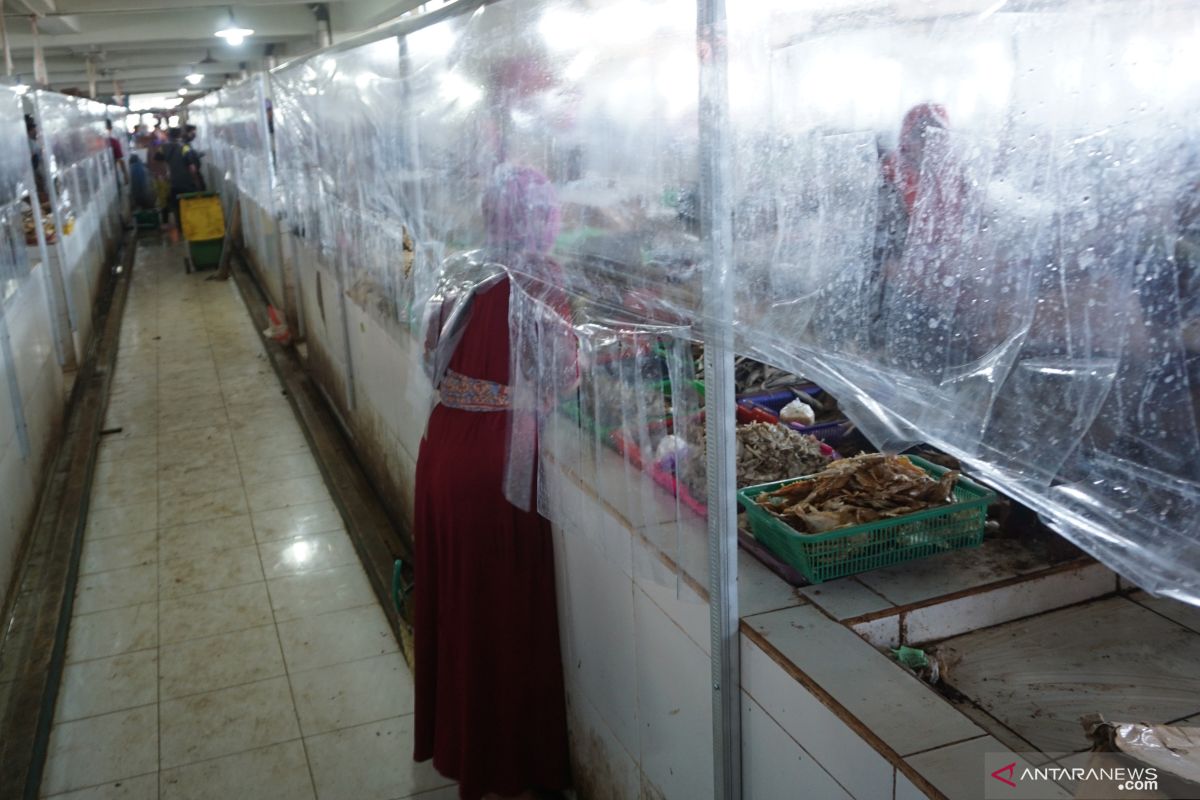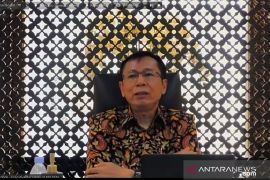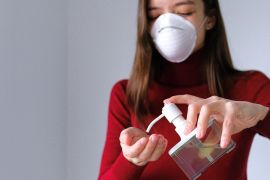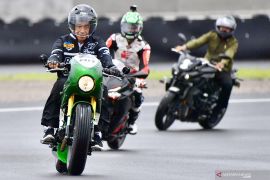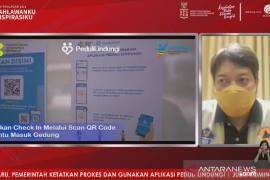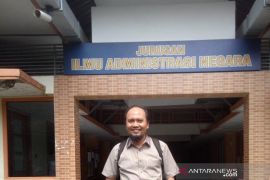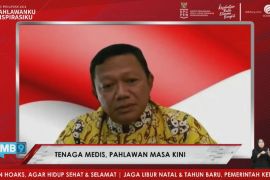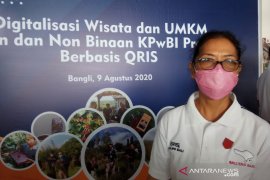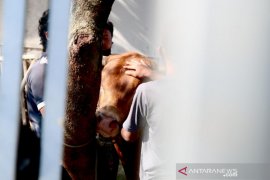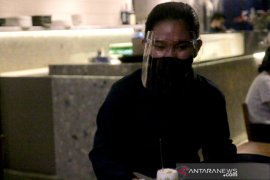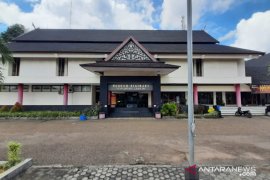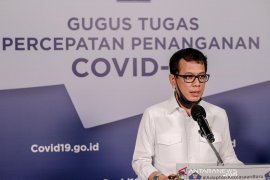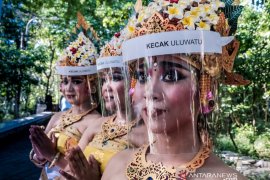Various policies will certainly have (their own) pros and cons, but if it (the traditional market) is not regulated, then crowding will still occur, and the COVID-19 pandemic will not endJakarta (ANTARA) - With Indonesia implementing the new normal, now being referred to as “adapting to new habits”, revival of trade, which had stalled due to the coronavirus pandemic, has been made a priority.
To revive the trade sector, especially traditional or wet markets, the government, through the Ministry of Trade, has issued health protocols that need to be obeyed by consumers as well as traders.
"In an effort to encourage the economic sector not to get worse, it is time for the economic joints to resume. However, as President Jokowi emphasized, public safety and health remain the government's priority," Trade Minister Agus Suparmanto said in a written statement released in June this year.
The new normal, which is the nation’s COVID-19 exit strategy, envisages opening the means of trade in five phases.
Opening up of trade would start from shopping centers, such as malls, traditional markets, supermarkets, medical equipment stores, entertainment facilities, and via tourism.
Visitors now need to wear masks and gloves at traditional markets. Traders need to be rotated and a minimum distance of 1.5 meters needs to be maintained between them.
Before the opening of markets, initial screening needs to be carried out to ensure the body temperature of traders and market managers is below 37.3 degrees Celsius. People who have respiratory symptoms, such as cough, flu and shortness of breath, need to be prohibited from entering the market.
Managers also need to prepare a hand-washing area, a sanitizer booth, ensure the availability of soap and hand sanitizers, as well as maintain cleanliness through spraying of disinfectants at the markets every two days.
Sales locations, including shanties, booths, and kiosks need to be cleaned before and after trading activities.
Public facilities such as toilets, landfills, parking lots, floors, gutters, and places to eat also need to be cleaned.
Managers also need to make circulation arrangements and set time limits for visits, as well as ensure the number of visitors is no more than 30 percent of the visitor capacity during normal conditions by applying strict controls on entrances and exits.
They also need to optimize outdoor spaces, such as parking lots, in the context of physical distancing, by setting up sales points and ensuring there is at least 2 meters distance between traders.
In market areas, visitors need to form queues, use gloves, carry their own shopping bags, and prioritize non-cash transactions. If there is a mosque, then a boundary marking is mandatory.
With the guidelines and various supporting facilities, buying and selling activities at traditional markets are slowly recovering. There is also growing public awareness about the prevention of COVID-19.
"People are now becoming more aware by wearing masks. Some traders are also providing plastic barriers,” said Aulia, 25, who shops at a traditional market based in Central Jakarta.
However, she said, she has continued to pay attention to the level of crowds in the market. If she finds that a market is busy, she chooses to not shop there.
"Sometimes, it is difficult to maintain a distance from other visitors when the market is crowded. So I choose not to take risks,” Aulia said.
The difficulty of implementing health protocols in traditional markets has led to their emerging as new clusters of COVID-19 transmission.
According to the Indonesian Traditional Market Traders Association (IKAPPI), 1,053 traders have so far tested positive for COVID-19, based on data as of July 13, 2020.
The cases are spread across 190 markets in 80 districts and cities and 26 provinces, with the highest number of infections seen in the provinces of Papua, DKI Jakarta, and East Java.
Responding to the findings, IKAPPI has asked local governments to conduct mass educational campaigns on COVID-19 by involving all traders in making policies related to health protocols for traditional markets.
Epidemiologist at Bali's Udayana University, Prof. Dr. D.N. Wirawan, said that from the experience of various countries, it can be seen that health protocols that are the most difficult to regulate involve crowd management in areas such as traditional markets.
"This condition must get serious attention, because the adopting of new habits does not mean (the situation would be as) normal as before COVID-19. There is a health protocol that must be applied with discipline and become a common concern; it (the situation) cannot be like it used to be," Wirawan noted.
He explained that for traditional markets, the main obstacle is very limited space for movement and the large number of traders, and it would not be easy to find a solution to this problem.
Thus, the most difficult health protocol to implement would be regulating the distance between merchants and buyers.
“Especially, with the stated, that the SARS-CoV-2 virus can spread through the air, the distance between merchants and buyers must be further than specified so far," he pointed out.
Wirawan acknowledged that it would not be easy to create a balance between economic aspects and health aspects in dealing with the pandemic. If the available space is sufficient, the distancing arrangements between merchants would be easier to make.
If obtaining additional space is not possible, then the only solution would be making arrangements through the government, including finding a new location so that the number of traders can be reduced and their distancing arrangements can be more relaxed.
Wirawan said, in several places in Indonesia, the distance between traders or kiosks needs to be confined or partitioned. Another health protocol that would be easier to implement is continuously monitoring the use of masks and face shields by traders and customers.
Yet another alternative would be to conduct surveillance at traditional markets by holding COVID-19 tests periodically so that traders contracting the virus can be identified immediately.
"Various policies will certainly have (their own) pros and cons, but if it (the traditional market) is not regulated, then crowding will still occur, and the COVID-19 pandemic will not end," Wirawan cautioned.
Related news: Public transport adapts for new normal, continues alternate seating
Related news: Restaurants in Jakarta reopen doors with caution
Related news: Places of worship adapt to new normal, strive for safety
Editor: Gusti Nur Cahya Aryani
Copyright © ANTARA 2020
